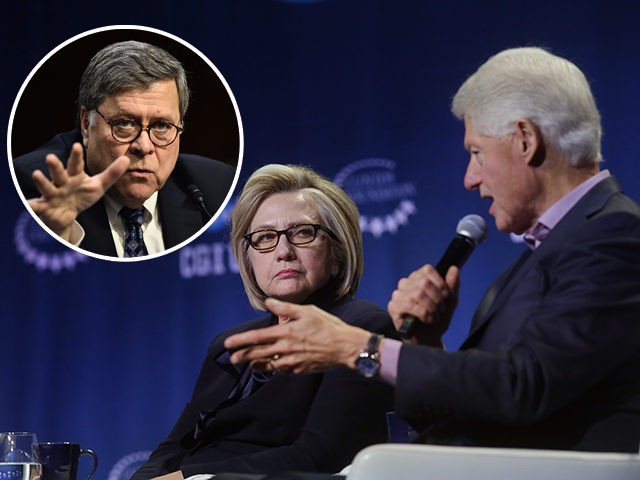Attorney General nominee William Barr said in 2017 that he believed there was more basis to investigate failed presidential candidate Hillary Clinton for her alleged role in the Uranium One agreement than President Donald Trump’s purported collusion with the Russian government in the 2016 election.
Following a call last year by President Trump for the Department of Justice to probe into Clinton’s role in the deal, Barr told the New York Times that there was “nothing inherently wrong” about a president requesting a probe — but cautioned that one shouldn’t be undertaken because the White House wants one. Barr also told the Times: “I have long believed that the predicate for investigating the uranium deal, as well as the foundation, is far stronger than any basis for investigating so-called ‘collusion.’”
“To the extent it is not pursuing these matters, the department is abdicating its responsibility,” he added.
In his confirmation hearing before the Senate Judiciary Committee Tuesday, Barr was asked about his previous comments regarding Uranium One. “I have no knowledge of Uranium One,” he told lawmakers. “I didn’t particularly think that was necessarily something that should be pursued aggressively. I was trying to make the point that there was a lot out there. I think all that stuff at the time was being looked at by [Utah U.S. Attorney John] Huber.”
Huber, tasked by then-Attorney General Jeff Sessions, is looking into whether the law enforcement officials ignored allegations of Clinton involved in the sale of American uranium rights.
“The point I was trying to make there was that whatever the standard is for launching an investigation, it should be dealt with evenhandedly,” Barr added.
Brought to the forefront by Breitbart News senior contributor-at-large Peter Schweizer in his New York Times best-selling book, Clinton Cash, the Uranium One scandal refers to an alleged scheme in which then-Secretary of State Hillary Clinton gave Russia control over more than 20% of America’s uranium supply in exchange for $145 million in pledges benefiting the Clinton family and their foundation.
Rosatom acquired a majority stake in Uranium One in 2010 and bought the remainder of the company in 2013. Because Uranium One had holdings in American uranium mines, which at the time accounted for about 20 percent of America’s licensed uranium mining capacity, Rosatom’s 2010 purchase had to be approved by the Committee on Foreign Investment in the U.S. Such committee, known as CFIUS, is made up of officials from nine federal agencies, including the State Department. Other agencies represented on the committee include the departments of Treasury, Defense, Commerce, Energy, and Homeland Security and the Office of the U.S. Trade Representative.
In April 2015, The New York Times published an article echoing much of the Schweizer book, including one item that not long after the Russians said they wanted to acquire a majority stake in Uranium One, former president Bill Clinton received $500,000 for a speech in Moscow. The speech was paid for by a Russian investment bank with links to the Kremlin as it promoted Uranium One stock.
Canadian financier Frank Giustra, a top Clinton Foundation donor, sold his company, UrAsia, to Uranium One, which was chaired by Ian Telfer, also a Clinton Foundation donor. Giustra has said he sold his stake in the deal in 2007, while Hillary Clinton and Barack Obama were vying for the Democratic presidential nomination.
According to Schweizer, who also serves as president of the Government Accountability Institute, the FBI, headed up by now special counsel Robert Mueller at the time, appears to have ignored evidence of Russian involvement in the uranium market when they approved the deal in 2010. “There was a megatons program that was designed to, in a sense, help the Russian nuclear industry transition from sort of military-based work to civilian work — a lot of detailed corruption that the FBI tracked in the 1990s and 2000s, so going up to the 2010 approval for Uranium One, it’s really impossible for senior FBI officials, including the director at the time — Mueller — to argue that they are just completely shocked that Uranium One and these kickbacks were taking place. It was widely known,” Schweizer told SiriusXM’s Breitbart News Tonight co-hosts Rebecca Mansour and Joel Pollak last February.
The congressional testimony of “Uranium One whistleblower” William Douglas Campbell has led to the convictions of Russian executives tied to Rosatom in 2015 on bribery and money-laundering charges in connection to the Uranium One agreement. “This is a guy who was an FBI witness. It’s known that the Russians were paying him $50,000 a month to do work for them, and some of that work included, according to his job description, setting up meetings with high-level ranking U.S. officials. That’s all not in dispute,” Schweizer said of Campbell. “So this is a guy that certainly was there. The FBI found him credible. He got FBI executives thrown into jail, and they eventually pleaded guilty to a variety of charges, including bribery and kickbacks. So you can’t dismiss, as some Clinton defenders want to, this whistleblower as if he has no credibility because he was there.”
The Associated Press contributed to this report.

COMMENTS
Please let us know if you're having issues with commenting.